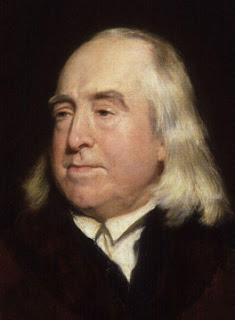Utilitarianism may be divided into 3 main components:
1. Motivation - Pleasure & Pain
2. Principle of Utility
3. The Hedonic Calculus
Motivation - Pleasure & Pain:
Bentham was a HEDONIST and therefore believed that human beings were motivated by the pursuit of pleasure and the avoidance of pain.
"Nature has placed mankind under the governance of two sovereign masters; pleasure and pain."
He saw this as a moral fact and maintained that pleasure and pain embodied good and bad. Utilitarianism may therefore be described as a hedonic theory.
Principle of Utility:
After establishing that pain and pleasure were the determining moral factors, Bentham developed the principle of UTILITY. This word comes from the latin "utilis" meaning useful and therefore Bentham concluded that the rightness or wrongness of an action may be judged by how useful it is OR, as indeed he was a hedonist, how much pleasure or good it created.
"An action is right if it produces the greatest good for the greatest number"
Utilitarianism may therefore be described as a teleological theory and the end result, happiness or pleasure, justifies the means. Furthermore the theory is democratic as it relies on a quantitative measurement of pleasure, not just pleasure for one person.
The Hedonic Calculus:
As an action may have several different consequences other than just good or bad, pleasure or pain, Bentham devised the Hedonic Calculus as a means in which to measure the usefulness of an action and therefore determine whether it is good or bad on a larger scale.
The Hedonic Calculus relies on 7 factors to determine how much pleasure or pain has been caused by an action:
Intensity - How great is the pleasure or pain?
Duration - How long will the pleasure or pain last?
Certainity - How definite is the pleasure or pain?
Propinquity - Refers to the proximity of pleasure/pain.
Fecundity - Are there any repurcussions of pleasure or pain?
Purity - Opposite to fecundity.
Extent - How many people will it affect?
The action that leads to the most pleasure for the most people is the morally right one.
BENEFITS OF BENTHAM'S UTILITARIANISM:
Flexibility - Has the ability to take into account any given situation individually rather than creating set rules. Furthermore it would accept the breaking of laws if greater happiness was the result of doing so.
Measurability - The Hedonic Calculus is unique in that it enables you to evaluate an action mathematically and come out with a conclusion.
CRITICISMS OF BENTHAM'S UTILITARIANISM:
Ambiguity - Has the potential to justify almost anything if in such as case it produces the greatest amount of happiness.
Quantitative - As the greatest amount of happiness is used as the embodiment of what is good the theory seems to neglect the quality of such happiness. For example is pleausre of the mind not more qualitative than pleasure of the body?
Neglects Minorities - For example, in India Sikhs are in a massive minority to both Muslims and Hindus. If someone were to annihilate all the Sikhs for the happiness of the Muslims and Hindus then according to Bentham's theory the majority would be happy and thus the action causes good. This therefore highlights the flaws in such a theory.
However... the context in which Bentham created Utilitarianism was to serve LAW REFORMS and therefore serves it purpose within the confines of that context. When we expand the theory into the realms of universal there are of course flaws as this was not Bentham's intention.

No comments:
Post a Comment